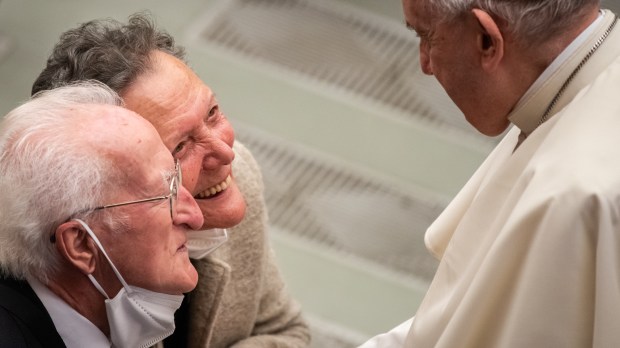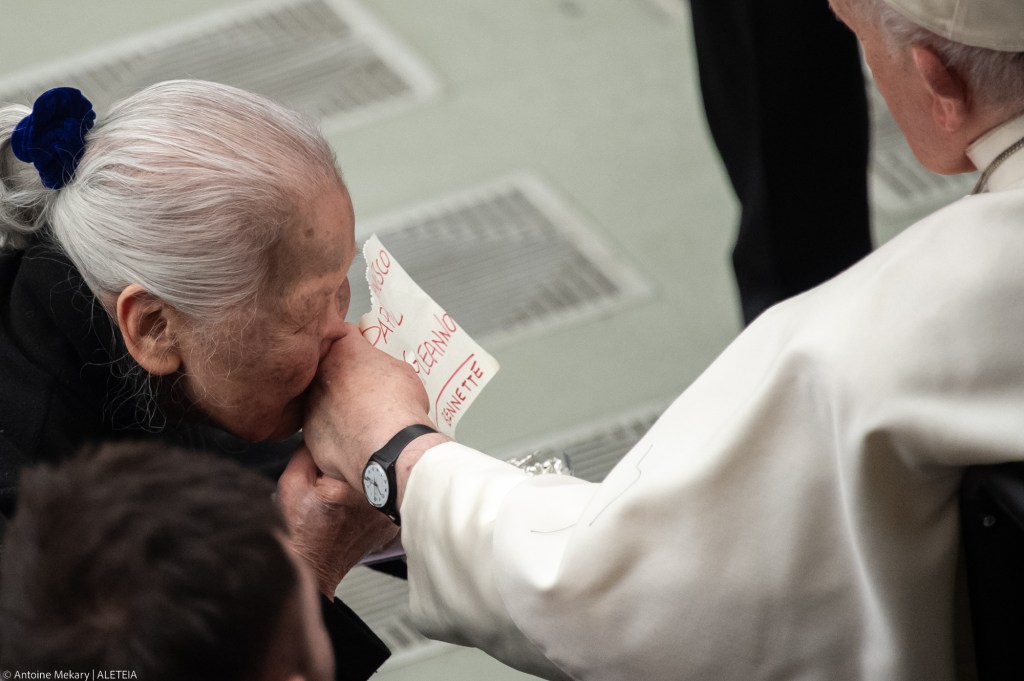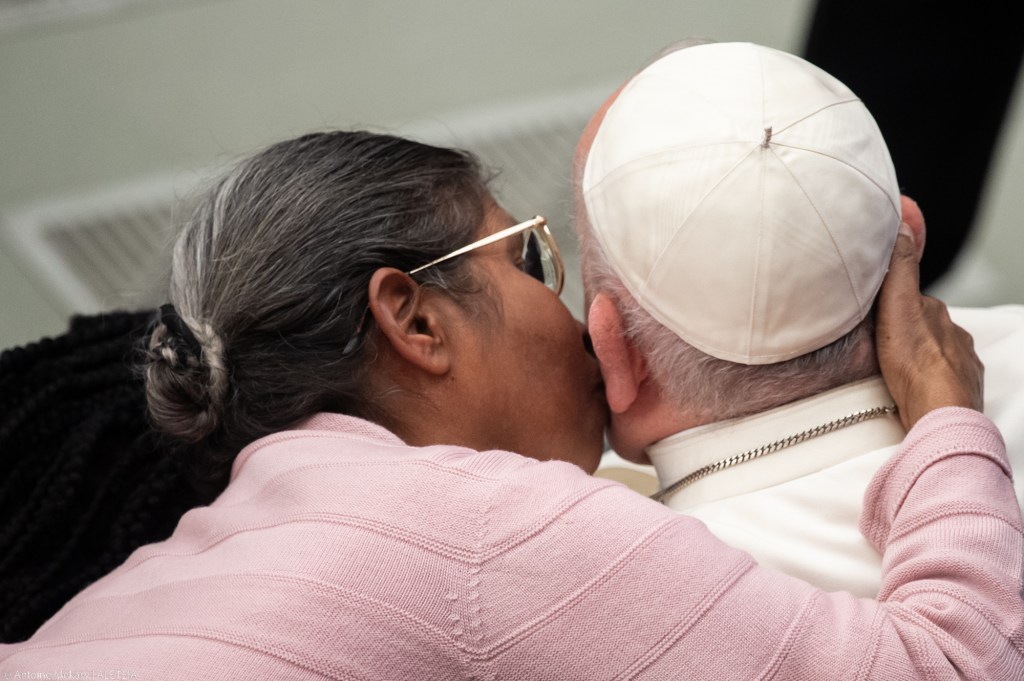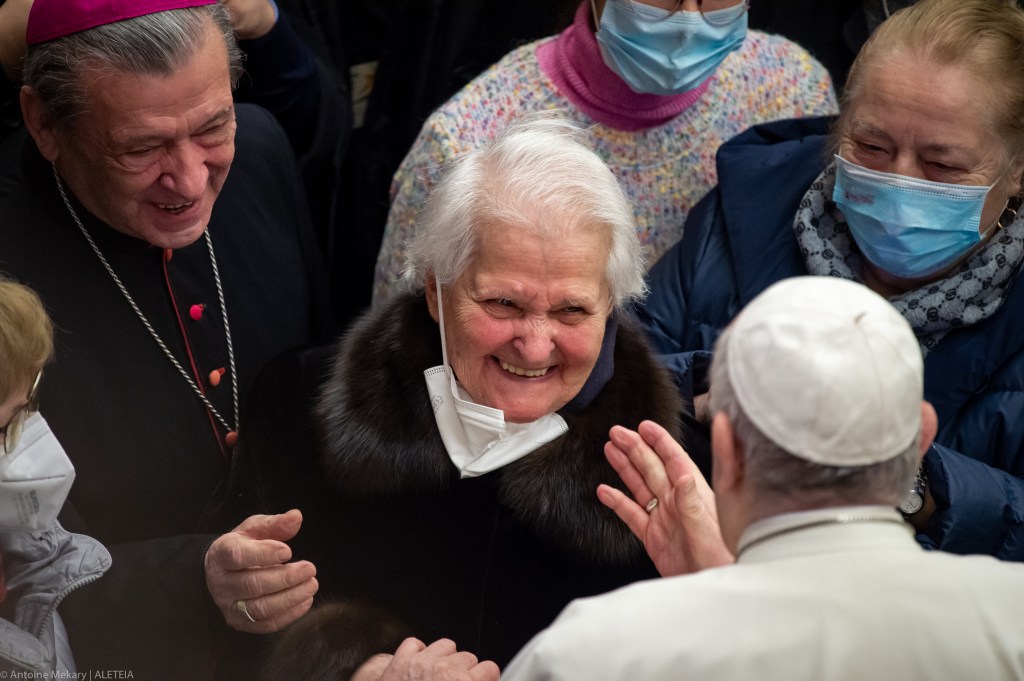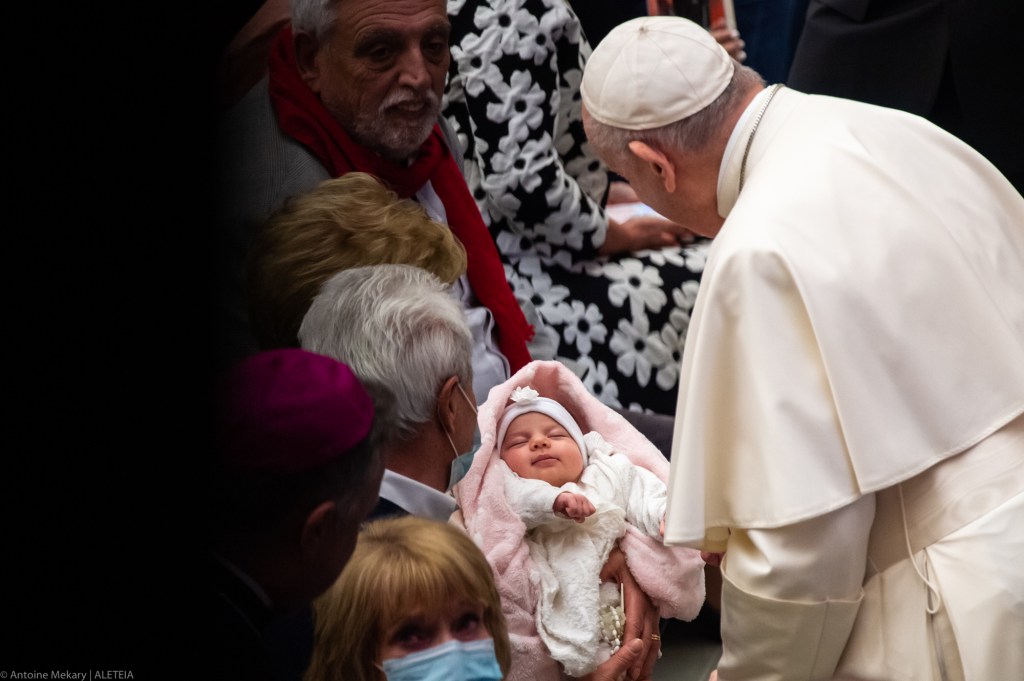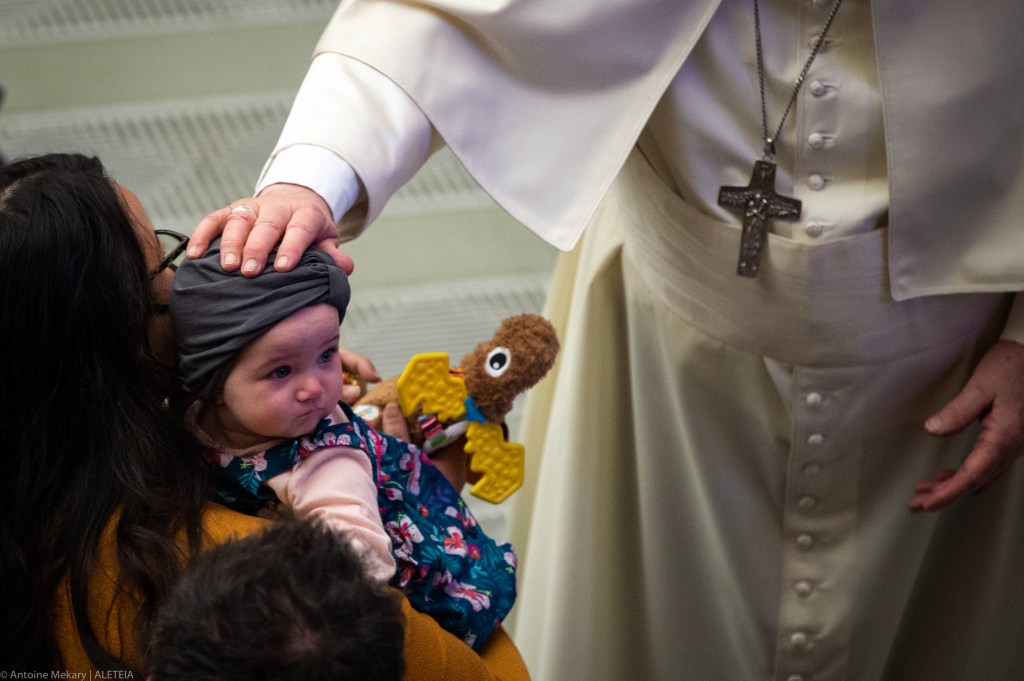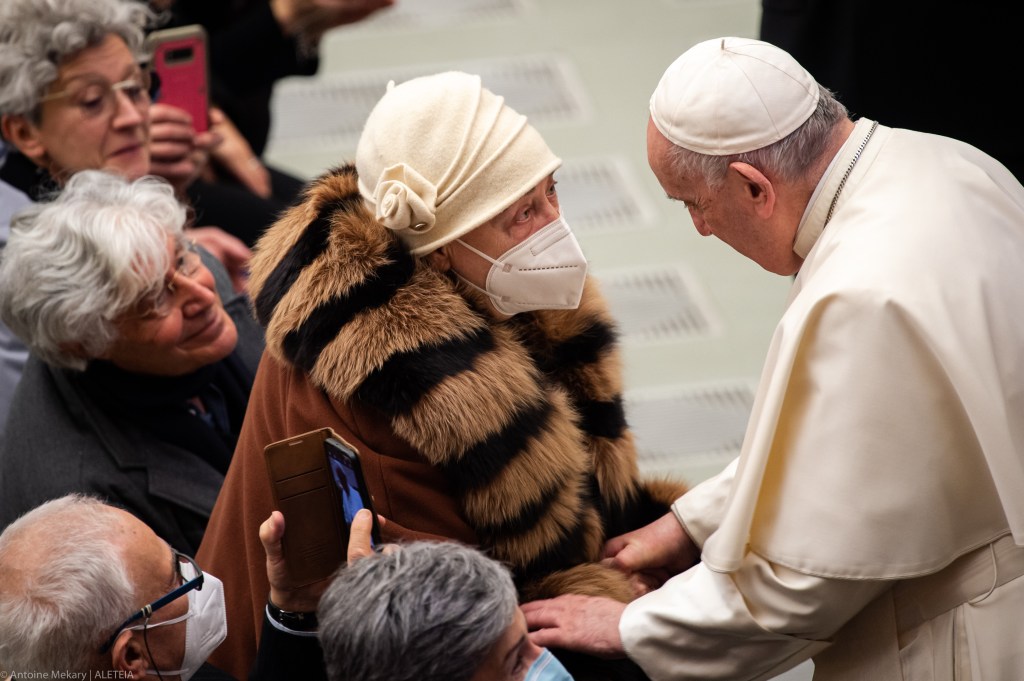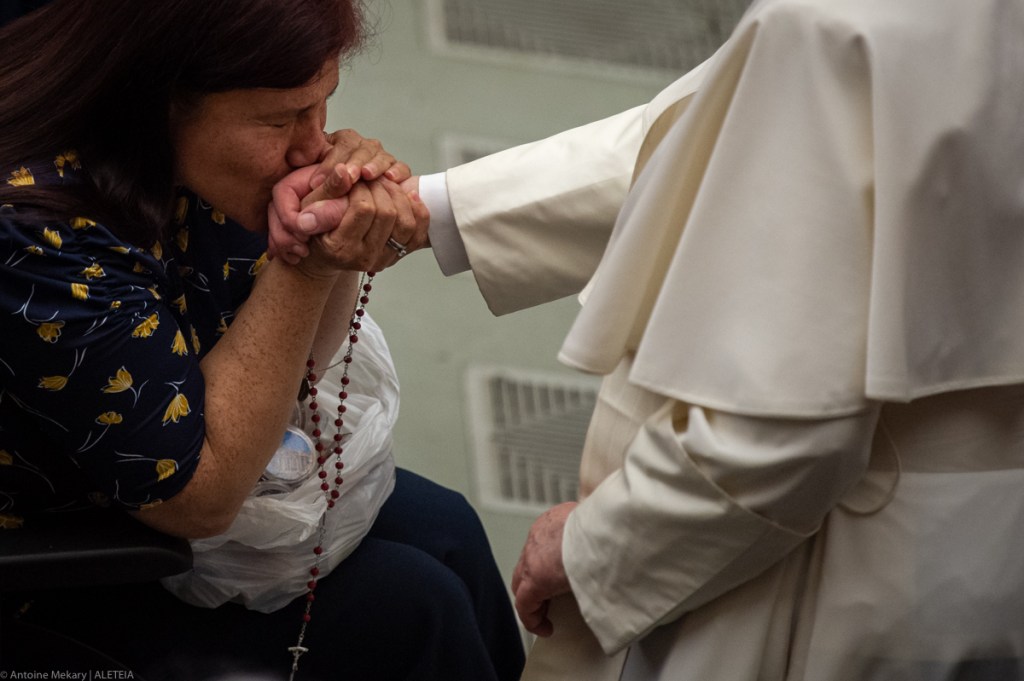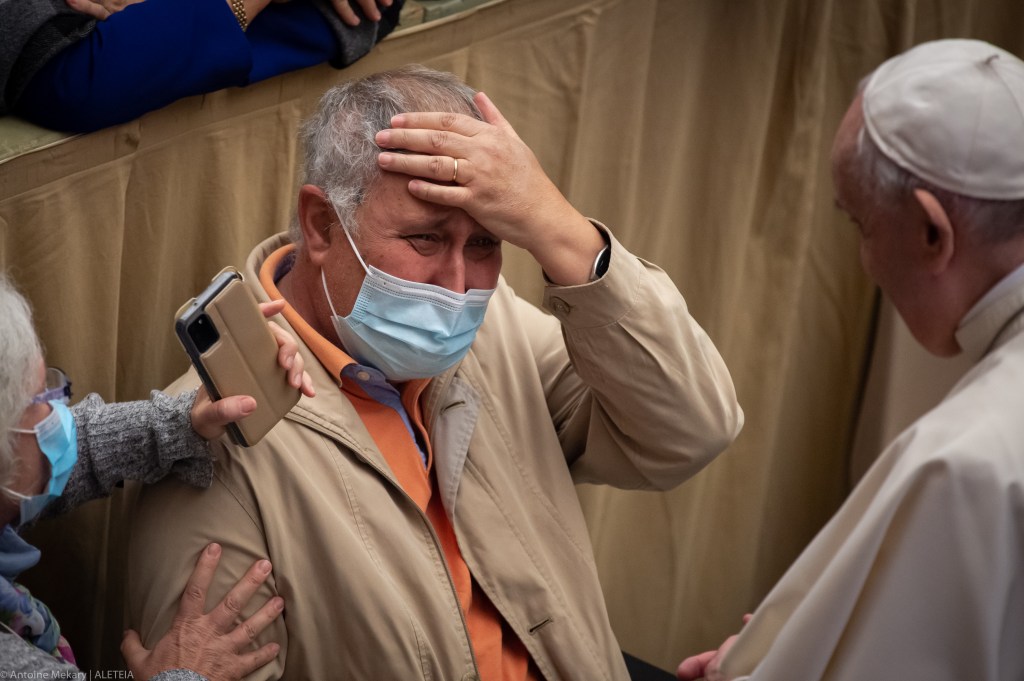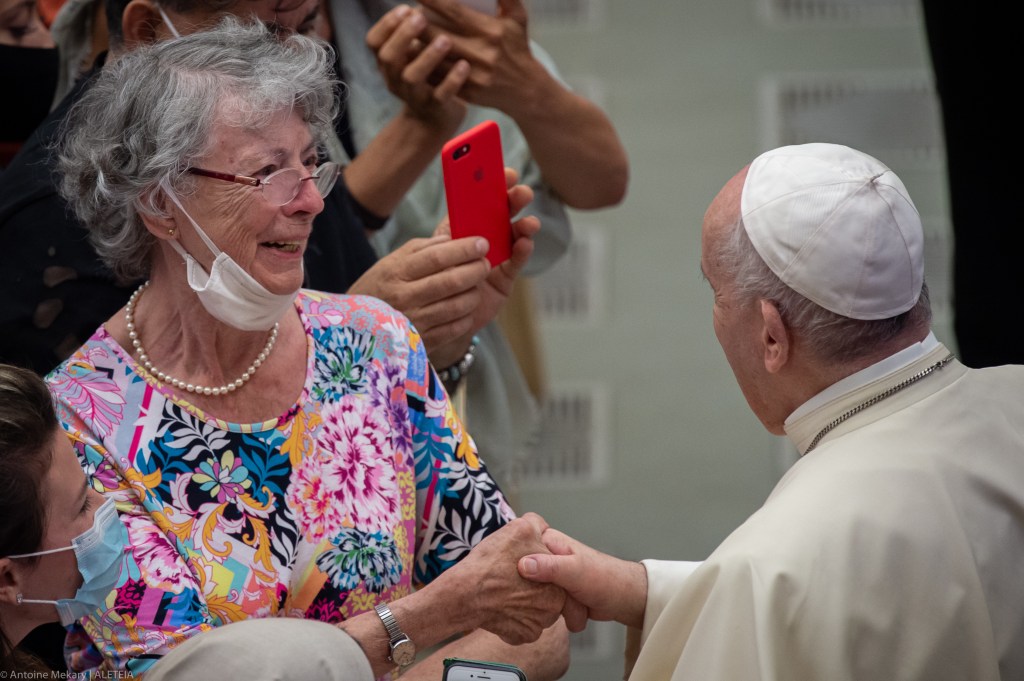Throughout his pontificate Pope Francis has often reminded us of the important role elders play in our society. This is such an essential theme to the Pontiff that in January 2021 he instituted the World Day for Grandparents and the Elderly, celebrated every year on the fourth Sunday of July. He explained at the time that this is so the day is celebrated “close to the feast of Saints Joachim and Anne, Jesus’ grandparents,” whose feast day is on July 26. As the third edition of this day approaches on July 23, 2023, Aleteia summarizes Pope Francis’ most forceful thoughts on the elderly.
1. The elderly and grandparents are a source of richness for young people
Even in a message dedicated to young people preparing for the 2023 World Youth Day in Lisbon, Pope Francis highlighted the elderly. “To prepare well, it’s good to look towards your roots. Try to spend time with the elderly. […] Talk a little with your grandparents. They’ll give you wisdom,” he said in a video message published in May 2023.
The interaction between generations as a way for young people to preserve their roots is a pillar of Pope Francis’ thoughts on the elderly. “What is our vocation today, at our age? To preserve our roots, to pass on the faith to the young and to care for the little ones. Never forget this,” Francis said in his first message for the World Day for Grandparents and the Elderly.
This vocation includes various responsibilities vis-a-vis young people, including sharing with them uncomfortable memories, such as “the painful memory of war” to ensure that they can remember the tragedies of history in order to “build a more human and welcoming world.”
Additionally, the elderly, having had more experience, can help young people find the right direction in their lives.
“The new generations expect from us, the elderly, a word that is prophecy, that opens the doors to new perspectives outside that carefree world of corruption, of the habit of corrupt things. […] The meaning is this: being a prophet of corruption and saying to others: ‘Stop, I have taken this path and it does not lead you anywhere! Now I will tell you about my experience.’ We, the elderly, should be prophets against corruption,” the Pontiff said during a general audience.
“There is no retirement age from the work of proclaiming the Gospel and handing down traditions to your grandchildren.”
2. Young people, go toward your elders as well
It is not just the elderly that can be a source of richness for young people, but the other way around as well. Pope Francis has highlighted how the bridge between young and old “will be the transmission of wisdom in humanity.”
“God wants young people to bring joy to the hearts of the elderly, as Mary did to Elizabeth, and gain wisdom from their experiences,” he said in his 2023 message for the World Day for Grandparents and the Elderly.
“Who, if not the young, can take the dreams of the elderly and make them come true?” he said in his first message. “Yet for this to happen, it is necessary that we continue to dream. Our dreams of justice, of peace, of solidarity can make it possible for our young people to have new visions; in this way, together, we can build the future.”
Additionally young people need to remember that many elderly are on their own and need company. In Pope Francis’ 2021 for the World Day for Grandparents and the Elderly, when many countries were still living through the COVID-19 pandemic, he reminded the elderly of those who came to visit them during these trying times as “angels” sent by the Lord.
“May every grandfather, every grandmother, every older person, especially those among us who are most alone, receive the visit of an angel!” the Pope said. During a general audience he also encouraged parents to “please, bring your kids” to the elderly.
3. Bearing fruit also in your old age
In his second message for the World Day for Grandparents and the Elderly, Pope Francis cited the Psalm “in old age they will still bear fruit” (92:15) to encourage the elderly to rediscover the beauty of their age. “We are tempted to ward off old age by hiding our wrinkles and pretending to be forever young, while on the other hand, we imagine that the only thing we can do is bide our time, thinking glumly that we cannot ‘still bring forth fruit,’” he explained.
However, the Pontiff highlighted that old age is the perfect moment to bear witness to one’s faith, especially for younger generations. “Old age is the phase in life best suited to spreading the joyful news that life is the initiation to a definitive fulfillment,” he said during a general audience. “The elderly are a promise, a witness of promise. And the best is yet to come. The best is yet to come: It is like the message of elderly believers.”
Francis suggests that the elderly can bear witness either through practical assistance or through prayer, which he defines as “the most valuable instrument” at the elderly’s disposal and the “best suited” for their age. “Old age must bear witness to children that they are a blessing. This witness consists in their initiation — beautiful and difficult — into the mystery of our destination in life that no one can annihilate, not even death,” the Pope said.
“I was called to become the Bishop of Rome when I had reached, so to speak, retirement age and thought I would not be doing anything new,” Pope Francis explained as an encouragement. “You know that the Lord is eternal; he never, ever goes into retirement.”
4. Stop the slow euthanasia of the elderly and counter the “throw-away” culture
When speaking to health workers, Pope Francis has strongly defended the elderly’s right to live, denouncing a “hidden and progressive euthanasia” against them, consisting for example in depriving them of the proper medical treatment in order to “save money.” This phenomenon is reflective of a more general mentality that Pope Francis calls “throw-away culture,” which sees the elderly as non productive members of society that can thus be cast aside.
“A culture of profit insists on casting off the old like a ‘weight.’ Not only do they not produce — this culture thinks — but they are a burden: in short, what is the outcome of thinking like this? They are thrown away. It’s brutal to see how the elderly are thrown away, it is a brutal thing, it is a sin! No one dares to say it openly, but it’s done! There is something vile in this adherence to the throw-away culture. But we are accustomed to throwing people away. We want to remove our growing fear of weakness and vulnerability; but by doing so we increase in the elderly the anxiety of being poorly tolerated and neglected,” the Pope said during a general audience on the family in 2015.
In fact the Pontiff has also highlighted that society offers the elderly “care plans, but not projects of existence,” to allow them to “live to the full.”
“Being old is just as important — and beautiful — it is equally important as being young,” he said, highlighting that old age makes up a third of the entire life span as people increasingly live longer.
5. Old age as projected toward fulfillment and a life that doesn’t end with death
Pope Francis highlighted in one of his general audiences that the elderly have the privileged position of seeing clearly, and with joy, what the true destination of life is. “In old age the works of faith, which bring us and others closer to the Kingdom of God, are by now beyond the power of the energy, words, and impulses of youth and maturity. But precisely in this way they make the promise of the true destination of life even more transparent. And what is the true destination of life? A place at the table with God, in the world of God,” he explained during a general audience.
The Pontiff also reminded the elderly that death is not something to be afraid of. “Our life is not made to be wrapped up in itself, in an imaginary earthly perfection. It is destined to go beyond, through the passage of death — because death is a passage. Indeed, our stable place, our destination, is not here; it is beside the Lord, where he dwells forever,” he explained.
““When will my Lord come? When will I be able to go there”? A little bit of fear, because I don’t know what this step means, and passing through that door causes a little fear. But there is always the hand of the Lord that carries us forward, and beyond the door there is the party,” the Pope said as he described going to the Kingdom of God.
“The time of aging that God grants us is already in itself one of those ‘greater’ works Jesus speaks of. In effect, it is a task that was not given to Jesus to fulfill: his death, his resurrection and his ascent to heaven made it possible for us!”
6. So many biblical examples to inspire the elderly!
During Pope Francis’ cycle of catecheses on old age, from February to August 2022, he also cited certain biblical figures as inspiring role models for the elderly. For example he recounts the story of Naomi and Ruth, an elderly mother-in-law and her young daughter-in-law, both widows, who through their relationship manage to push each other out of hardship. Similarly, in this year’s message for the World Day for Grandparents and the Elderly, Pope Francis highlights Mary’s visit to Elizabeth as an example of “the bond that unites young and old.”
Another example the Pontiff cites is Eleazar, a 90-year-old man who refuses to pretend-follow a king’s decree in order to save his life. “The central point is this: dishonoring the faith in old age, in order to gain a handful of days, cannot be compared with the legacy one must leave to the young, for entire generations to come. But well done Eleazar!” exclaimed the Pope.
Or Judith, “a biblical heroine” who defeated a dictator and went on to live until she was 105. “Judith was soon widowed and had no children, but, as an old woman, she was able to live a season of fullness and serenity, in the knowledge that she had lived to the fullest the mission the Lord had entrusted to her. […] As a young woman, she had won the esteem of the community with her courage. As an old woman, she garnered esteem because of the tenderness with which she enriched their freedom and affections.”
“Remember: One of these days, take the Bible and look at the Book of Judith: it is very short, it is easy to read. It is ten pages long, no more,” Pope Francis said.
